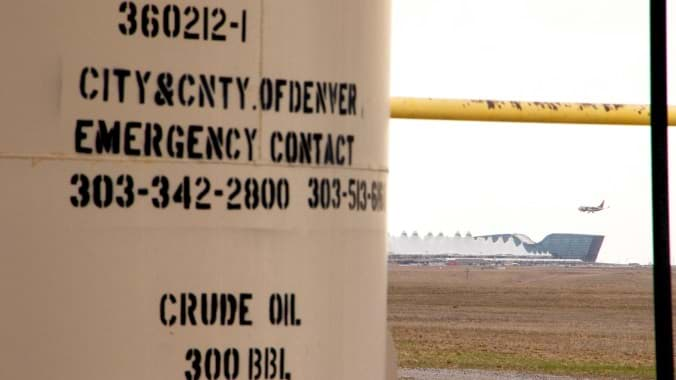DIA's Oil and Gas Rigs Have Sat Idle for Over a Year Now, But it Might Not Always Be That Way

Denver has not extracted any oil or gas from the wells since May 2018, according to George Karayiannakis, senior vice president of commercial properties at Denver International Airport. The wells, which have sat on the prairie around DIA since before the city annexed the land from Adams County, have all been shut down for now.
But
only three have been permanently closed, Karayiannakis told members of the
Denver City Council’s aviation committee Wednesday. The rest could be revived
by attaching a gas gathering line to the rigs.
“I
would say there are no immediate or near- or long-term plans in place today to
begin production on oil and gas at the airport,” said Rachel Marion, DIA’s
director of government affairs. “That being said I think it’s part of a broader
citywide policy discussion that I understand is happening now.”
Marion
said that oil and gas extraction is one of many options the taxpayer-owned
airport has to generate revenue. The more money DIA makes, the friendlier it
can be with airline gate fees, which can attract more airlines and
destinations. In turn, the enterprise grows. Marion cited an expected decrease
in parking revenue as one example of where DIA might seek to pad its already
robust budget.
DIA
pulled in more than $1 billion in revenue last year — $653.4 million in profits
— according to the city budget. It is Colorado’s most powerful economic engine.
If
the city were to reopen the rigs, it would have to hire contractors to operate
them, meaning the Denver City Council would have to approve.
City
Councilwoman Amanda Sawyer said Denverites aren’t interested in being in the
oil and gas business, regardless of where airport revenues stand.
“I
do have a little bit of concern around the theory that extracting oil and gas
from our land out at DEN to keep our gate fees low is somehow required or
something,” Sawyer said. “I feel like we maybe need to stay away from that
theory because I think that’s a policy conversation that is probably not gonna
get a lot of traction.”
On
the campaign trail in March, Hancock said the city government was in the
process of divesting from oil and gas. Denver had less than 1 percent of its
investment portfolio tied up with fossil fuel money, he said. The mayor’s
office confirmed Friday that the city sold all fossil fuel-related bonds in its
$6 billion portfolio in April.
Mike
Strott, a spokesman for the mayor’s office, said the administration has not
committed to permanently shutting down the wells. They are still part of the
airport’s “revenue profile,” he said, even though they are not producing any
revenue.
“It’s
an option from the menu of options in their revenue profile, but that doesn’t
mean it’s an option that will be utilized,” Strott said.
In
fact, the wells actually cost the city money. The City Council’s aviation
committee just advanced $3.8 million worth of contracts for companies to
monitor the idle rigs to comply with state and federal regulations. An oil
spill occurred earlier this year, DIA’s Karayiannakis said. But having the
contractors on hand allowed them to clean it up “immediately.”
“There
are no plans to re-open the wells, and this is a broader discussion happening
in the community, among city council and in the administration because it’s an
important policy issue in Colorado currently,” Strott wrote in an email.
The closest home to an extraction site is in Green Valley Ranch about 25,000 feet away, or almost five miles.
